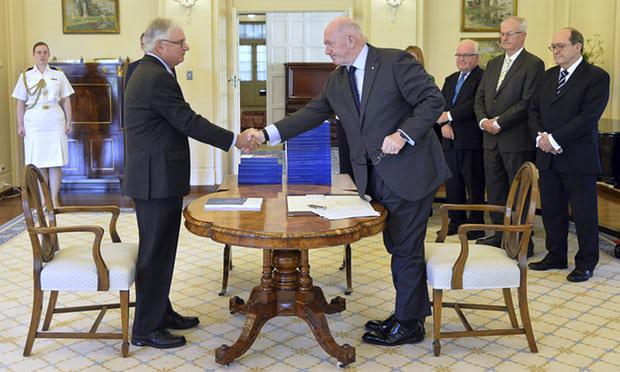|
The child abuse commission didn't flinch. Can Australia show the same courage?
By David Marr
[with video] It’s huge. Don’t believe anyone who tells you they’ve already absorbed its lessons. Digesting the 17 volumes of the report of the royal commission into institutional responses to child sexual abuse is a work in progress for the nation. It’s going to take time. Journalists and economists are given a head start on the Australian federal budget each year: a few hours’ lockup to help them get on top of the budget before it’s delivered. We – survivors, bishops, lawyers and journalists – should have been locked up with this for a week. The danger is that after we’ve flicked through its pages for a few hours, checked out the recommendations and honed in on the more outrageous failings of the Catholic church, these volumes will fade from attention. But this is a long game. That’s clear even from the bulk of the thing stacked in two blue piles, threatening to tip over the governor general’s table while he shuffled papers about and signed something – a receipt? – for his summer reading. At that point, Peter McClellan and his team of commissioners lost all their powers. For five years they’ve dug documents from their hiding places, quizzed the highest in the land, heard survivors map their horrors and researched the past in painstaking detail. Now all that’s left is this report. And all it can do is ask or, in the lingo of these things, make recommendations. Nowhere are the limits of the commission’s powers more evident than in the half dozen recommendations this team of civilians – two judges, a former cop, an adolescent psychiatrist, a productivity commissioner on leave and a former politician – make to the Catholic bishops of Australia to have a word to Rome to address the failings of their church. Most are blindingly obvious: that church law, for instance, be changed so child sexual abuse becomes a canonical crime, not just a moral failing or a breach of priestly obligations of celibacy. Makes perfect sense. But it’s hard to imagine the courtiers of Rome, who have heard the same plea from their bishops in America and Ireland for decades, paying much attention to this tag team of Australians. But all power to the commissioners for saying so – and recommending pontifical secrecy (punishment: excommunication) should no longer apply to allegations of child abuse. Ditto that the confessional no longer be used to hide paedophile priests or silence their victims. And that priests be allowed to marry. Not to be deterred from having a go is, in its way, inspiring: new-world chutzpah at its best. The commissioners have put in print proof of the damage done and the obvious solutions and then begged the local bishops to send them north. No one is expecting an outcome any time soon. Various local bishops were immediately on hand to slap the commissioners down. Repentance is one thing. Change is another. The smiles of the bishops were wonderful as they delivered the verdict – so patient, so forgiving. But for as long as they sit on library shelves – or on the commission website, which is to remain live for the duration – these volumes will be the source of impeccable, secular research into arcane matters that have contributed to making the Catholic church the worst of the institutional offenders. So much knowledge is in these volumes. There are chapters here on the weird history of celibacy and the attitudes it has induced over the centuries, including the “widely held ‘belief’ among clergy that the vow of celibacy was connected to heterosexual relations involving penetration and did not extend, for example, to acts of indecency or to encounters with male children … ” The royal commission was one of those rare things in Australia: an idea we didn’t fudge. It was executed beautifully. It never lost its overwhelming public backing. Somehow it managed to traverse extraordinarily difficult terrain with little – not none, but the minimum – controversy. But now it’s been thrown into the political pit. That’s where it has to survive: down in the states and territories. There it will be facing many of the same opponents who worked to preserve religious “freedoms” supposedly put at risk by equal marriage. Old, useful, familiar privileges are at stake. The record for implementing the recommendations made so far by the commission is not encouraging. In a corner of one of the volumes released today is a sad list of opportunities lost to implement the simplest things they have suggested to make children safer – such as national codes for mandatory reporting of abuse and a national model for working-with-children checks. Their commissioners don’t suggest despair. They’re being patient. There’s no drama in these volumes, just evidence talking – clear exposition and hundreds and hundreds of endnotes. The commissioners are also playing a long game. No one is let off the hook. They don’t offer the easy comfort of blaming the church or even the politicians. Change, they argue, is up to us all: “We cannot avoid the conclusion that the problems faced by many people who have been abused are the responsibility of our entire society.” What’s needed now is courage and time – not least time to read. It’s going to be a serious summer.
|
.
Any original material on these pages is copyright © BishopAccountability.org 2004. Reproduce freely with attribution.
